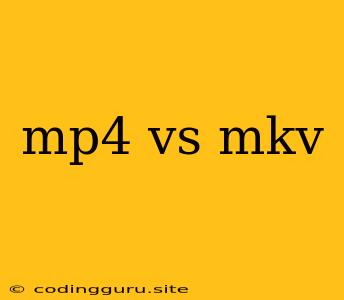MP4 vs MKV: Which Video Format Reigns Supreme?
In the vast digital landscape, choosing the right video format is crucial for seamless playback, optimal quality, and efficient storage. Two prominent contenders vying for dominance are MP4 and MKV. Both offer unique advantages, but which one reigns supreme? This comprehensive guide delves into the depths of MP4 vs MKV, exploring their strengths, weaknesses, and suitability for diverse needs.
MP4: The Versatile Video Workhorse
MP4, short for MPEG-4 Part 14, is a ubiquitous video format renowned for its versatility and widespread compatibility. It's embraced by countless devices, including smartphones, tablets, laptops, and even dedicated media players.
Why Choose MP4?
- Extensive Compatibility: MP4 enjoys widespread support across operating systems, software programs, and hardware devices, making it a safe bet for sharing and playback.
- Compression Efficiency: MP4 employs advanced compression algorithms, allowing you to store high-quality videos in smaller file sizes, saving precious storage space.
- Streaming Optimization: MP4 is the preferred format for streaming services like YouTube and Netflix, delivering smooth video playback without buffering issues.
- Metadata Support: MP4 files can store rich metadata, including subtitles, chapters, and cover art, enriching the viewing experience.
Limitations of MP4
- Limited Codec Support: While MP4 supports a range of codecs, it might not be the ideal choice for advanced features like multi-channel audio or lossless video compression.
- Potential for Quality Loss: MP4 often relies on lossy compression, which can introduce slight quality degradation, especially at very high compression ratios.
MKV: The Feature-Rich Contender
MKV, short for Matroska, is a more recent video format that distinguishes itself by embracing a wider array of features and flexibility.
Why Choose MKV?
- Open-Source and Free: MKV is an open-source format, free from licensing restrictions, making it a compelling option for developers and enthusiasts.
- Unparalleled Versatility: MKV can accommodate multiple audio tracks, subtitles, and even chapters, offering a rich and customizable viewing experience.
- Lossless Compression Options: Unlike MP4, MKV supports lossless compression, preserving the original video quality without any compromise.
- High-Quality Audio Support: MKV can handle advanced audio codecs like DTS and AC3, ensuring high-fidelity audio playback.
Limitations of MKV
- Limited Compatibility: MKV enjoys wider support, but its compatibility might not be as universal as MP4, especially on older devices or certain software programs.
- Larger File Sizes: MKV often results in larger file sizes due to its support for multiple audio tracks and lossless compression.
MP4 vs MKV: The Verdict
The best choice between MP4 and MKV ultimately depends on your specific needs and priorities.
Choose MP4 if:
- You need maximum compatibility with various devices and software programs.
- You prioritize smaller file sizes and efficient storage.
- You require a format suitable for streaming services.
Choose MKV if:
- You desire a format that supports multiple audio tracks, subtitles, and chapters.
- You prioritize audio quality and lossless compression.
- You're comfortable with potentially limited device compatibility.
Conclusion
Both MP4 and MKV offer distinct advantages, catering to different user profiles. MP4 excels in its widespread compatibility and efficient compression, making it a versatile choice for everyday video needs. On the other hand, MKV embraces features like lossless compression and multiple audio tracks, appealing to users seeking a feature-rich and customizable experience. Ultimately, the decision comes down to understanding your individual requirements and selecting the format that best aligns with your priorities.
